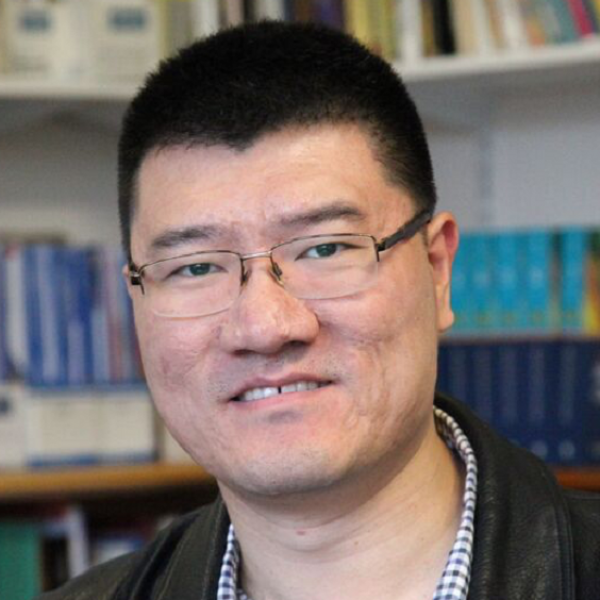Computer science
We are using advanced computational methods including mathematical modelling, machine learning and artificial intelligence to progress dementia research.

Advanced computational methods and models allow scientists and clinicians to analyse complex clinical and biological data. This can lead to more accurate and efficient diagnosis for dementia and speeds up drug discovery.
Our research is developing and applying computational methods to improve clinical neuroscience research. We use mathematical and cognitive models to understand disease mechanisms related to dementia.
The University of Sheffield has a world-class computer science and engineering research community. Our researchers have extensive expertise in statistical methods, machine learning, artificial intelligence, mathematical/cognitive modelling and bioinformatics.
Our researchers specialise in neuroimaging analysis including multivariate and multimodal imaging data analysis, cognitive modelling, wearable and assistive technology.
Our research
Machine learning group
Our machine learning group aims to develop interpretable models for learning useful features from multidimensional data and analysing complex networks via tensor and related methods. We study the following two research problems related to dementia.
1) Prediction with sparse tensor models:
- We model 3D fMRI data as third-order tensors to directly extract or select features for accurate and interpretable prediction.
- We develop tensor-based feature extraction methods to learn useful features for accurate prediction in neural decoding.
- We develop sparse tensor models (as extensions to lasso / elastic net) on 3D fMRI data for accurate neural decoding and brain disease classification.
2) Domain adaptation for transfer learning:
- We leverage related source datasets to improve prediction accuracy on a targeted dataset.
- We develop a domain adaptation framework with feature and classifier adaptation to improve whole-brain neural decoding of fMRI.
- We develop domain-independent feature extraction models to learn useful features from multi-site brain imaging data for neural decoding [2b] and autism classification.
Contact: Dr Haiping Lu
Computational methods to develop early diagnostics and treatments for dementia
Machine learning is one of the promising approaches that can help identify clinical and neuropathology features to better understand influential features to dementia and detect this type of illness as early as possible. Machine learning methods can reveal useful insights in datasets related to dementia to improve predictive accuracy and diagnosis efficiency when compared with conventional methods that rely on domain experts. These methods do not replace domain experts such as medical professionals rather it assists them reaching out the right decision on time.
Our current studies are using feature selection to identify neuropathology features that predict cognitive decline in individuals in the Cognitive Function and Ageing Study.
Key academic staff
Partner with us
We are proud to work in collaboration with other organisations and seek new and exciting opportunities to further enhance our research.
We are especially keen to partner with medical device and pharmaceutical companies to test our predictive models as companion diagnostics. New biomarkers discovered from our computational studies can be co-developed in partnerships between academia and industry.
Contact: Professor Li Su
-
Key publications
-
Diego Castillo-Barnes, Li Su, Javier Ramrez, Diego Salas-Gonzalez, Francisco J. Martinez-Murcia, Ignacio A. Illan, Fermin Segovia, Andres Ortiz, Carlos Cruchaga, Martin R. Farlow, Chengjie Xiong, Neil R. Graff-Radford, Peter R. Schofield, Colin L. Masters, Stephen Salloway, Mathias Jucker, Hiroshi Mori, Johannes Levin, Juan M. Gorriz (2020) Autosomal Dominantly Inherited Alzheimer Disease: Analysis of genetic subgroups by Machine Learning, Information Fusion. 58: 153-167
Jian Zhang J, Li Su (2015). Temporal Autocorrelation-Based Beamforming with MEG Neuroimaging Data, Journal of the American Statistical Association, 110(512):1375-1388.
Li Su, Yujing Huang, Yi Wang, James Rowe, John O’Brien (2018) Predict Disease Progression with Reaction Rate Equation Modeling of Multimodal MRI and PET, Frontiers in Aging Neuroscience. 10: 306.
Mwiza Kunda, Shuo Zhou, Gaolang Gong, and Haiping Lu, “Improving multi-site autism classification based on site-dependence minimisation and second-order functional connectivity”, preprint at bioRxiv (2020).
Shuo Zhou, Christopher R Cox, and Haiping Lu, "Improving Whole-Brain Neural Decoding of fMRI with Domain Adaptation", in Proceedings of the 10th International Workshop on Machine Learning in Medical Imaging (MLMI 2019), Shenzhen, China, pp. 265-273, 2019.
Shuo Zhou, Wenwen Li, Christopher Cox, and Haiping Lu, "Side Information Dependence as a Regularizer for Analyzing Human Brain Conditions across Cognitive Experiments", in Proceedings of the 34th AAAI Conference on Artificial Intelligence (AAAI 2020), New York, New York USA. pp. 6957-6964, 2020.
Wenwen Li, Jian Lou, Shuo Zhou, and Haiping Lu, "Sturm: Sparse Tubal-Regularized Multilinear Regression for fMRI", in Proceedings of the 10th International Workshop on Machine Learning in Medical Imaging (MLMI 2019), Shenzhen, China, pp. 256-264, 2019.
Wharton SB, Wang D, Parikh C, Matthews FE, Brayne C & Ince PG (2019) Epidemiological pathology of Aβ deposition in the ageing brain in CFAS : addition of multiple Aβ-derived measures does not improve dementia assessment using logistic regression and machine learning approaches. Acta Neuropathologica Communications, 7(1), 1-12.
Xiaonan Song and Haiping Lu, "Multilinear Regression for Embedded Feature Selection with Application to fMRI Analysis", in Proceedings of the 31st AAAI Conference on Artificial Intelligence (AAAI 2017), San Francisco, California, USA. pp. 2562-2568, 2017.
Xiaonan Song, Lingnan Meng, Qiquan Shi and Haiping Lu, "Learning Tensor-Based Features for Whole-Brain fMRI Classification", in Proceedings of the 18th International Conference on Medical Image Computing and Computer Assisted Intervention (MICCAI 2015), Munich, Germany, pp. 613-620, 2015.


